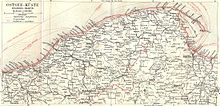Wiekowice
| Wiekowice | ||
|---|---|---|

|
|
|
| Basic data | ||
| State : | Poland | |
| Voivodeship : | West Pomerania | |
| Powiat : | Sławno | |
| Gmina : | Darłowo | |
| Geographic location : | 54 ° 18 ' N , 16 ° 22' E | |
| Height : | 15 m npm | |
| Residents : | 480 | |
| Telephone code : | (+48) 94 | |
| License plate : | ZSL | |
| Economy and Transport | ||
| Next international airport : | Danzig | |
| Szczecin-Goleniów | ||
Wiekowice ( German ( New) Wieck ) is a village in the rural community (gmina wiejska) Darłowo ( Rügenwalde ) in the Powiat Sławieński ( district of Schlawe ) in the Polish West Pomeranian Voivodeship .
Geographical location
The farming village is located in Upper Pomerania in the Grabow ( Grabowa ) glacial valley , which defines the landscape, about 14 kilometers south of the Baltic Sea town of Darłowo and 23 kilometers southwest of Sławno .
The place is intersected by a side road that connects the national road 6 ( European road 28 ) Stettin - Danzig with the voivodship road 203 Koszalin ( Köslin ) - Darłowo ( Rügenwalde ) - Ustka ( Stolpmünde ). The Stargard – Gdansk railway runs through the town to the south, and the train station is Wiekowo ( Alt Wieck ), a district of Wiekowice. The highest point of the place is 25 meters above sea level .
Neighboring municipalities of Wiekowice are: Wierciszewo ( Wandhagen ) in the west, Bielkowo ( Beelkow ) in the north-west, Dobiesław ( Abtshagen ) in the north, Przsytawy ( Pirbstow ) in the east, Grabowo ( Martinshagen ) in the southeast and Grabówko ( Neu Martinshagen ) in the south and Dąbrowa ( Damerow ).
Place name

The place name also comes earlier as Wieck , Wyk , Wich , Wych , Die Wiecke . The entire flat ridge on which Wiekowice lies with Wiekowo and Dobiesław was formerly called "auf der Wieck" . The name is likely to be derived from the Latin “vicus”, which means “village”. The vernacular explains the name of "affwäke" = "to deviate" and describes the direction of view of the place from Buckow Monastery to which the place once belonged.
history
The village of Wieck was founded in the 14th century as a Hagenhufendorf . As early as 1258, the site on which the village was later built came to the Buckow monastery . After the Reformation in Pomerania in 1535 , Wieck fell to the ducal office of Rügenwalde .
Around 1780 there were in Wieck: 1 Schulzen, 20 farmers, 2 country cottages, 3 street cottages, 1 Büdner, 1 shepherd's cottage and a total of 35 fireplaces. The village was one of the largest in the region.
Until 1945, the municipality of Wieck with the places Abtshagen (now Polish: Dobiesław), Beelkow (Bielkowo), Eventin (Iwięcino) and Wandhagen (Wierciszewo) belonged to the Eventin district in the Schlawe i district. Pom. in the administrative district of Köslin . The last German mayor was Reinhold Rubow. As a civil registry office, Wieck was connected with Abtshagen to the Abtshagen registry office. The registry office that still exists from before 1945 is now in the Darłowo registry office ( Rügenwalde ).
Towards the end of the Second World War , on March 5, 1945, Alt Wieck was occupied by the Red Army . Wieck became part of Poland as Wiekowice .
The place is now part of the Gmina Darłowo in the Powiat Sławieński of the West Pomeranian Voivodeship (until 1998: Köslin Voivodeship ).
church
The village (Neu-) Wieck belonged to the parish Abtshagen (Dobiesław) until 1945 with Alt Wieck (Wiekowo ). Most of the residents belonged to the Protestant church, whose house of worship was the village church of Abtshagen . The parish was in the parish of Rügenwalde in the church province of Pomerania of the Church of the Old Prussian Union . The last German clergyman was Pastor Friedrich Jahn.
Today the population of Wiekowice belongs mainly to the Polish Catholic Church . The Protestant church members are cared for by the Koszalin ( Köslin ) parish in the Pomeranian-Greater Poland diocese of the Polish Evangelical-Augsburg (i.e. Lutheran) Church.
school
Until 1945 there were two schools in Wieck. Both buildings (built around 1895) were two-tier and had teachers' apartments. School I took in the children from Alt Wieck (Wiekowo). The last German school holder was teacher Gramzow. In school II the children from Wieck were taught, most recently by teacher Dorow.
literature
- Ludwig Wilhelm Brüggemann : Detailed description of the current state of the Königl. Prussian Duchy of Vor and Hinter Pomerania . Part II, Volume 2: Description of the court district of the Royal. State colleges in Cößlin belonging to the Eastern Pomeranian districts . Stettin 1784, pp. 861-862, paragraph (23).
- Manfred Vollack (Ed.): The Schlawe district. A Pomeranian homeland book. 2 volumes, Husum 1989.
